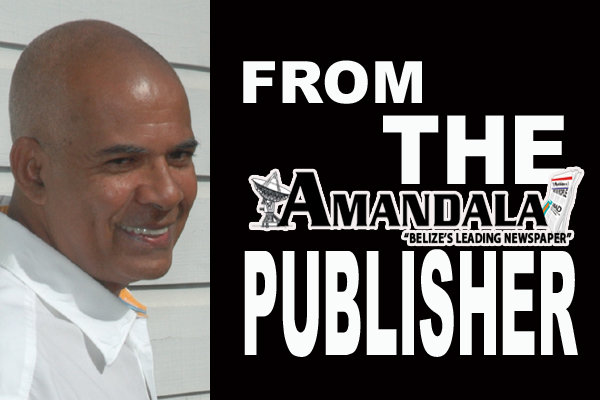The Maritime Areas Act (MAA), which was introduced in the Belize House of Representatives in August of 1991, was a very complex document, very difficult to understand. There is an area of the sea, which Belizean fishermen have known as the Gulf of Honduras, where the maritime rights of Belize, Guatemala, and Honduras overlap. Apparently these are areas which are very rich in petrocarbons and minerals, and it was in the interests of some huge corporate concerns to get the matter of the three nations’ rights sorted out so that exploration and exploitation of the specific maritime areas could be facilitated.
The Maritime Areas Act was such a big deal that the two most powerful leaders of the Opposition United Democratic Party (UDP) at the time, Rt. Hon. Manuel Esquivel and Hon. Dean Barrow, supported the ruling People’s United Party (PUP), led by the Rt. Hon. George Price, when the Maritime Areas Act was introduced.
The Maritime Areas Act split the UDP, as their Albert area representative, Hon. Philip Goldson, led a breakaway from the party. The breakaway group included the Freetown area representative, Hon. Derek Aikman; the Belize Rural North area representative, Hon. Sam Rhaburn; former Lake Independence area representative, Hubert Elrington; and the attorney B. Q. Pitts. Mr. Goldson proceeded to form a new political party, the National Alliance for Belizean Rights (NABR). But Messrs. Rhaburn, Elrington, and Pitts soon returned to the UDP, only Aikman remaining with Mr. Goldson.
The Guatemalan President at the time was one Jorge Serrano, and the corporate climate in the politics of Guatemala and Belize was so powerful in 1991 that Serrano actually recognized the independence and territorial integrity of Belize, for which act of treachery, in the eyes of the Guatemalan ruling classes, he was run out of Guatemala and sought exile in Panama.
There can be no doubt that the Maritime Areas Act represented a highly professional attempt by corporate interests to bypass the region’s state politics, most prominently the aggressive, ancient Guatemalan claim to Belize (formerly British Honduras), affecting the Gulf of Honduras. In other words, the likelihood is that Señor Serrano was paid large sums of money. Insofar as the Belizean political interests were concerned, your guess is as good as mine. But, even as he had upset the Seventeen Proposals applecart back in 1966, Philip Goldson upset the Maritime Areas Act applecart in 1991. The UDP’s Esquivel and Barrow had to withdraw their support from the MAA because of the heat Goldson was bringing.
23 years later, the question I would ask is on what precise basis Mr. Goldson rejected the Maritime Areas Act. In 1991, Mr. Goldson was practically blind. The MAA was a long and complicated document. It did not appear to me that Mr. Goldson had a high-level group of advisers around him in 1991. The late Carlton Fairweather was his daily companion, his eyes in effect, but Carlton was neither a lawyer, an accountant, an engineer, or a cartographer. I am tempted to believe that Mr. Goldson’s rejection of the Maritime Areas Act may have been more knee-jerk and instinctive rather than analytical.
I am not saying that the MAA did not deserve to be rejected by Belizeans. What I am saying is that it was such a complex document, it really required detailed analysis by trained minds. The Seventeen Proposals (1968) and the Heads of Agreement (1981) had been fairly straightforward documents. By comparison, the Maritime Areas Act was extremely technical. Some highly trained people put in a lot of work to prepare the MAA. It is for sure they were very well paid. Huge corporate interests believed it was worth the money they were spending on the document because of the wealth of resources in the Gulf of Honduras.
His Maritime Areas Act move ended up costing Derek Aikman his spectacular political career. Derek had never been any kind of critic of American foreign policy. In his youth, this man had actually been the “page” of a well-known United States Senator. In fact, his Ministry of Education initiative with respect to the University College of Belize (UB), which involved having the American university, Ferris State University, “godfather” UCB, was practically neoliberal. So then, why did he join Mr. Goldson in attacking the Maritime Areas Act, which was so clearly a child of United States regional foreign policy?
In 1987, UDP Leader/Prime Minister, Hon. Manuel Esquivel, had replaced Dean Lindo as UDP Chairman with Aikman. Derek carried out some political hatchet jobs for Mr. Esquivel, most notably the one on Rufus X in Belize Rural North in 1988. What happened between then and 1991 inside the UDP? Essentially, one must surmise, Dean Barrow replaced Derek in Sir Manuel’s galaxy of stars.
Whatever the case, Derek Aikman became a historic political sacrifice in 1992 when both the ruling PUP and the Opposition UDP collaborated in the lawsuits which led to Derek’s being declared a bankrupt.
Esquivel’s UDP and Goldson’s NABR became so bitterly estranged in early 1993 that the PUP decided to call early general elections, fifteen months before they were due. It did not seem possible that the UDP and NABR could forge a workable coalition in time for the June 30 general election of 1993, but they did. UDP/NABR won a stunning, narrow victory, 16-13.
The basis for the coalition had been Mr. Esquivel’s promise to Mr. Goldson that he would repeal the Maritime Areas Act if the UDP/NABR won and he, Esquivel, then became Prime Minister. Esquivel never repealed the MAA. The Maritime Areas Act was apparently too big to be repealed. For this reason, the Act continues to require the most careful of study by the best of our Belizean minds.
Power to the people.


